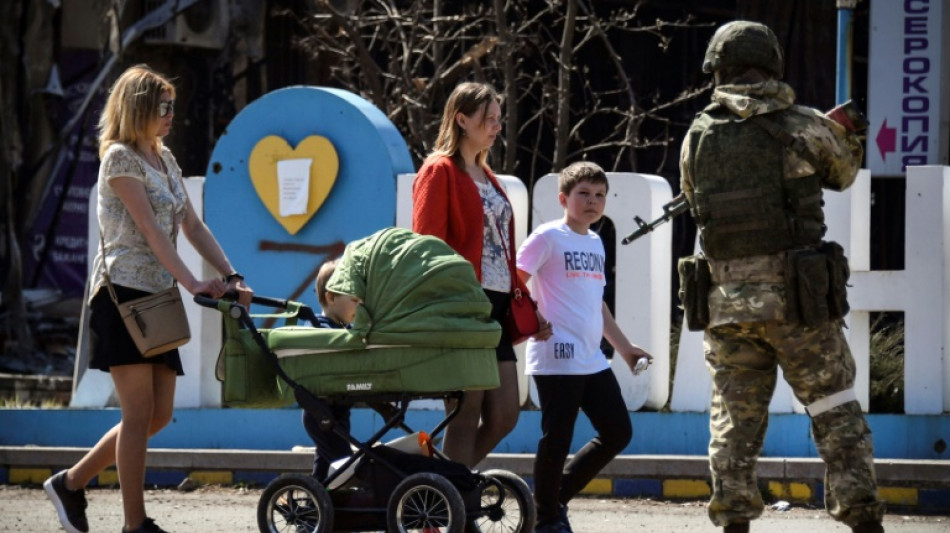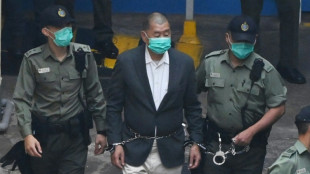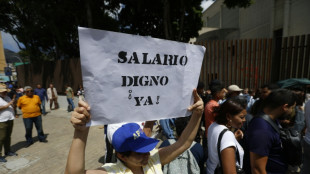
-
 Scotland spoil Italy's T20 World Cup debut with big win
Scotland spoil Italy's T20 World Cup debut with big win
-
Stocks track Wall St rally as Tokyo hits record on Takaichi win

-
 Israeli president says 'we will overcome evil' at Bondi Beach
Israeli president says 'we will overcome evil' at Bondi Beach
-
Munsey leads Scotland to 207-4 against Italy at T20 World Cup

-
 Venezuela's Machado says ally 'kidnapped' after his release
Venezuela's Machado says ally 'kidnapped' after his release
-
Japan restarts world's biggest nuclear plant again

-
 Bangladesh poll rivals rally on final day of campaign
Bangladesh poll rivals rally on final day of campaign
-
Third impeachment case filed against Philippine VP Duterte

-
 Wallaby winger Nawaqanitawase heads to Japan
Wallaby winger Nawaqanitawase heads to Japan
-
Thailand's Anutin rides wave of nationalism to election victory

-
 Venezuela's Machado says ally kidnapped by armed men after his release
Venezuela's Machado says ally kidnapped by armed men after his release
-
Maye longs for do-over as record Super Bowl bid ends in misery

-
 Seahawks' Walker rushes to Super Bowl MVP honors
Seahawks' Walker rushes to Super Bowl MVP honors
-
Darnold basks in 'special journey' to Super Bowl glory

-
 Japan's Takaichi may struggle to soothe voters and markets
Japan's Takaichi may struggle to soothe voters and markets
-
Bad Bunny celebrates Puerto Rico at Super Bowl, angering Trump

-
 Seahawks soar to Super Bowl win over Patriots
Seahawks soar to Super Bowl win over Patriots
-
'Want to go home': Indonesian crew abandoned off Africa demand wages

-
 Asian stocks track Wall St rally as Tokyo hits record on Takaichi win
Asian stocks track Wall St rally as Tokyo hits record on Takaichi win
-
Hong Kong sentences pro-democracy mogul Jimmy Lai to 20 years in jail

-
 Bad Bunny celebrates Puerto Rico in joyous Super Bowl halftime show
Bad Bunny celebrates Puerto Rico in joyous Super Bowl halftime show
-
Three prominent opposition figures released in Venezuela

-
 Japan PM Takaichi basks in historic election triumph
Japan PM Takaichi basks in historic election triumph
-
Israeli president says 'we shall overcome this evil' at Bondi Beach

-
 'Flood' of disinformation ahead of Bangladesh election
'Flood' of disinformation ahead of Bangladesh election
-
Arguments to begin in key US social media addiction trial

-
 Gotterup tops Matsuyama in playoff to win Phoenix Open
Gotterup tops Matsuyama in playoff to win Phoenix Open
-
New Zealand's Christchurch mosque killer appeals conviction

-
 Leonard's 41 leads Clippers over T-Wolves, Knicks cruise
Leonard's 41 leads Clippers over T-Wolves, Knicks cruise
-
Patriots-Seahawks Super Bowl approaches as politics swirl

-
 Trump says China's Xi to visit US 'toward the end of the year'
Trump says China's Xi to visit US 'toward the end of the year'
-
Real Madrid edge Valencia to stay on Barca's tail, Atletico slump

-
 Malinin keeps USA golden in Olympic figure skating team event
Malinin keeps USA golden in Olympic figure skating team event
-
Lebanon building collapse toll rises to 9: civil defence

-
 Real Madrid keep pressure on Barca with tight win at Valencia
Real Madrid keep pressure on Barca with tight win at Valencia
-
Dimarco helps Inter to eight-point lead in Serie A, Juve stumble

-
 PSG trounce Marseille to move back top of Ligue 1
PSG trounce Marseille to move back top of Ligue 1
-
Two prominent opposition figures released in Venezuela

-
 Hong Kong to sentence media mogul Jimmy Lai in national security trial
Hong Kong to sentence media mogul Jimmy Lai in national security trial
-
Lillard will try to match record with third NBA 3-Point title

-
 Vonn breaks leg as crashes out in brutal end to Olympic dream
Vonn breaks leg as crashes out in brutal end to Olympic dream
-
Malinin enters the fray as Japan lead USA in Olympics team skating

-
 Thailand's Anutin readies for coalition talks after election win
Thailand's Anutin readies for coalition talks after election win
-
Fans arrive for Patriots-Seahawks Super Bowl as politics swirl

-
 'Send Help' repeats as N.America box office champ
'Send Help' repeats as N.America box office champ
-
Japan close gap on USA in Winter Olympics team skating event

-
 Liverpool improvement not reflected in results, says Slot
Liverpool improvement not reflected in results, says Slot
-
Japan PM Takaichi basks in election triumph

-
 Machado's close ally released in Venezuela
Machado's close ally released in Venezuela
-
Dimarco helps Inter to eight-point lead in Serie A


'Russia, our sacred state!': school reopens under Moscow control
In the playground of a school in the war-torn eastern Ukrainian town of Volnovakha, now under Moscow's control, children listen to a recording of the Russian anthem, watched by armed soldiers.
Several dozen pupils have lined up outside for a formal "back to school" ceremony, a month after the town was taken by Russian troops and Moscow-backed separatists.
Volnovakha has no electricity or working telephone lines, AFP journalists found while taking part in a media trip organised by the Russian army.
Widespread shelling has destroyed houses, shops and cafes, evidence of the fierce fighting for a town strategically located halfway between the main regional city of Donetsk and the port of Mariupol.
Russian troops have besieged Mariupol for a month and a half and the city on the Sea of Azov seems likely to fall shortly.
As Russia puts it, Volnovakha has been "liberated" from neo-Nazi Ukrainians.
"It's time to learn. Hurry up, children!" a small rosy-cheeked girl with white bows in her hair announces, speaking into a microphone.
Behind her, the school staff are standing next to a Russian flag and that of the separatist Donetsk People's Republic (DNR).
Nearby a soldier in a cagoule and helmet -- one of the troops accompanying the journalists -- stands watching, holding a submachine gun.
As a sound system plays the DNR anthem and then the Russian anthem -- which opens "Russia, our sacred state, Russia, our beloved country!" -- staff and pupils stand silently, their faces impassive.
- 'Lived through horror' -
Russia's conquest of Volnovakha on March 11 allowed its forces to encircle Mariupol from the north, having attacked the strategic Sea of Azov port from the east and west.
This came after Volnovakha and its Ukrainian defending troops were bombarded for two weeks.
Many houses, shops and public buildings are now semi-ruined, windowless or burnt-out.
Russia argues that such destruction here, and elsewhere in Ukraine, came about because Kyiv's forces used the local population as human shields.
After a month under Moscow's control, there are still scenes of devastation all around. There is a huge hole in the facade of the hospital and trees nearby have been snapped in half.
Yellow-painted School Number 5, which is in the centre of the town, has also suffered from shelling, with gaping holes in place of several windows and shattered bricks. This is the only school to reopen so far.
"We lived through horror. There was terrible bombing," says Lyudmila Khmara, the 52-year-old school administrator.
She says that she wants to stay in Volnovakha, all the same, because: "nowhere is as good as home".
She says she hopes Volnovakha will become "part of Russia", where no one will be forced to speak Ukrainian, while this part of Ukraine is overwhelmingly Russian-speaking.
Moscow justifies its military operation in Ukraine citing the need to protect the Russian-speaking population.
- In survival mode -
The army is leaving nothing to chance. Even with no sign of resistance, tanks and military vehicles decorated with the letter Z patrol the streets as local civilians walk around and cycle.
The municipal hospital continues to function as best it can, despite lacking electricity and suffering extensive bomb damage.
In the semi-darkness, a nurse, 46-year-old Natalya Nekrasova-Mukhina, says that most patients, from children to the elderly, come to be treated for shrapnel wounds.
Local residents are still living in survival mode.
"We have no gas, no water, no electricity and no phone line. We live like we're in a hole," says Lyudmila Dryga, 72, a retired crane operator.
Another local woman, Svetlana Shcherbakova, 59, recounts how she lost everything except ID documents when her house burned down.
"We received humanitarian aid just once, that was it," says the former supermarket security manager, her voice trembling.
A 35-year-old railway mechanic, Anton Varusha, estimates that less than half of the people living on his street have returned to live in Volnovakha, which had around 20,000 inhabitants before the bombardment.
"I don't know yet whether I'll stay here. At the moment, I have my parents here, who are old and sick," he says.
He says locals are struggling to get information on what is happening, with no electricity or internet.
"We try to listen to various radio stations, so we can somehow compare (accounts of) what is going on," he says.
Y.AlMasri--SF-PST




